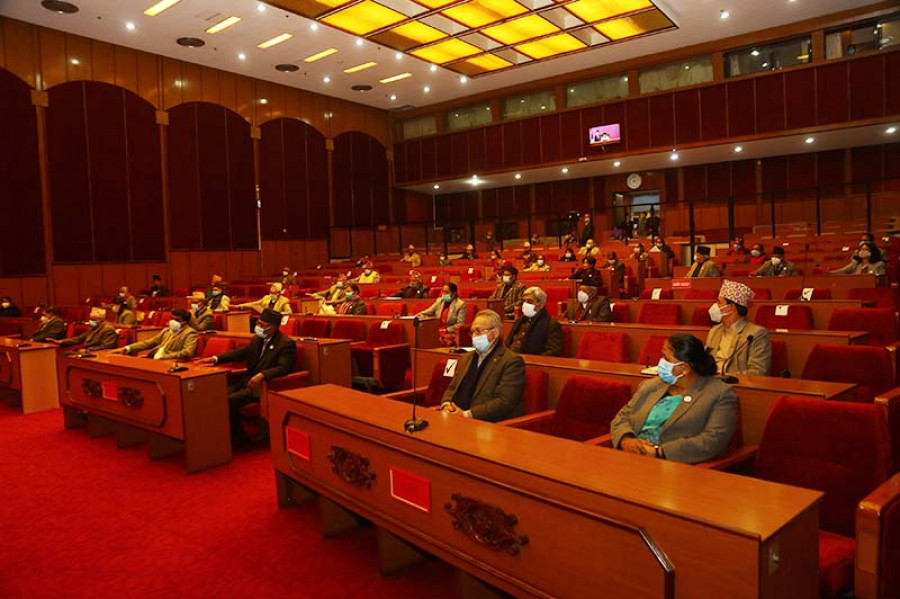National
All you need to know about National Assembly elections
19 members will be elected on January 26 to replace those who are retiring on March 4.
Post Report
Nominations have been filed for 19 National Assembly members for which elections have been scheduled for January 26. As many as 20 members, including one nominated, are set to complete their terms on March 4. The ruling alliance of five parties are contesting the elections jointly against the main opposition CPN-UML, which currently enjoys a majority in the upper house.
Here is all you need to know about the National Assembly elections.
What is the composition of the National Assembly?
Nepal’s National Assembly has 59 members. Of them, 56 are elected, and three are nominated by the President on the recommendation of the Council of Ministers.
Why are the 20 members retiring on March 4?
Terms of the members of the National Assembly are determined by drawing lots—for two years, four years and six years. The 20 members who are retiring on March 4 had got four years when they drew the lots in June 2018. Earlier, 19 members had retired in March last year and elections to replace them were held on January 20, 2020. Elections for another 20 members who have six-year terms will be held after two yours.
How are the 56 National Assembly members elected?
The National Assembly members are elected by an electoral college.
Each of the seven provinces elects eight members.
The electoral college is made up of members of the provincial assembly and chairperson/mayor and vice-chairperson/deputy mayor of local units within the province.
Each provincial assembly member's vote has a weight of 48 whereas each chairperson/mayor/vice-chairperson/deputy mayor's vote carries a weight of 18.
What is the current combination of the National Assembly?
In the 59-member National Assembly, 23 members are from the UML and 13 from the Maoist Centre, excluding the chair (from the UML) and vice-chair (from the Maoist Centre). The Nepali Congress and the CPN (Unified Socialist) have seven members each, Janata Samajbadi Party has two and Loktantrik Samajbadi Party has one. There is one independent member.
How many members from which party are retiring on March 4?
Eight members from the UML, three each from the Nepali Congress, Maoist Centre and CPN (Unified Socialist), two from Janata Samajbadi Party and one nominated—Ram Narayan Bidari—are retiring on March 4
How have the ruling coalition partners divided the seats among themselves?
On Monday, the ruling coalition divided seats among the partners—six for the Congress, five each for Maoist Centre and CPN (Unified Socialist), two for the Janata Samajbadi Party and one for the Rastriya Janamorcha. The ruling partners have divided eight seats from the UML—three to Congress, two each to the Maoist Centre and the CPN (Unified Socialist), and one to the Rastriya Janamorcha.
Who are the contestants?
UML: Guru Baral, Sumitra Bhandari and Sonam Gyalgen Sherpa from Province 1; Asarfi Yadav and Bina Shah from Province 2; Gopal Shakya and Nirkumari Kunwar Darlami from Bagmati; and Punya Prasad Poudel, Lila Pokhrel Thanet and Arjun Sunam from Gandaki. Similarly, Ram Dayal Gupta, Bharati Khanal and Krishna Bahadur Sunar from Lumbini; Chudamani Sharma, Ganga Thapa Mahat and Padam Bahadur Majhi from Karnali; and Dilliraj Bhatta, Santosh Kumari Sharma and Naresh Bishwakarma from the Sudurpaschim Province.
Nepali Congress: Gopal Basnet from Province 1, Krishna Prasad Poudel from Bagmati, Kamala Panta from Gandaki, Yubaraj Sharma from Lumbini, Durga Kumari Gurung from Karnali, and Narayandutta Mishra from Sudurpaschim.
Maoist Centre: Urmila Aryal from Province 2 (woman), Suresh Ale Magar from Gandaki (others category), Bharat Sunar (Dalit category), Nar Bahadur Bista from Karnali Province (differently-able category), and Jagat Parki (Dalit category) from Sudurpaschim
CPN (Unified Socialist): Jayanti Rai (woman) from Province 1 and Goma Timilsina (woman) from Bagmati. Rajya Laxmi Gaire (woman) from Lumbini, Udaya Bohora (open) from Karnali, and Madan Kumari Shah (woman) from Sudurpaschim.
JSP: Hemraj Rai (minority) from Province 1 and Khalid Siddhiki (open) from Province 2.
Rastriya Janamorcha: Tul Bdr Bishwakarma (Dalit) from Lumbini.




 8.79°C Kathmandu
8.79°C Kathmandu














